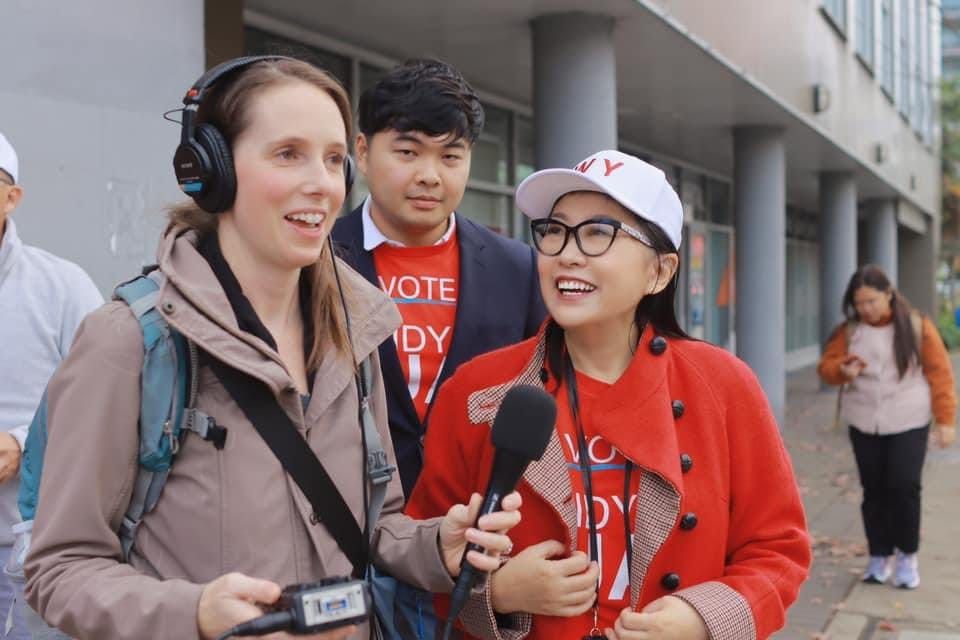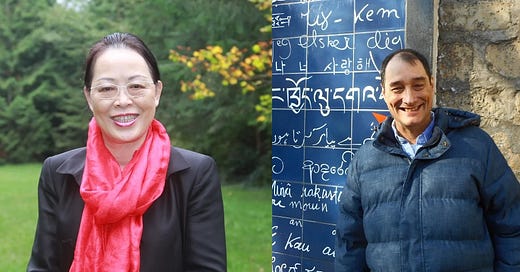B.C. Conservative Teresa Wat says that she felt more attacked by independent candidates than by the B.C. NDP
Richmond-Bridgeport candidate Charlie Smith points to some of the issues and articles in the campaign that may have irritated the veteran politician
As a former independent candidate in Richmond-Bridgeport, I’m happy to report that I may have generated some distress within the B.C. Conservative camp.
According to a Chinese-language article in Ming Pao Daily, my B.C. Conservative opponent, Teresa Wat, accused her independent opponents of putting tremendous pressure on her. The newspaper notes that she never experienced such stress in her three previous election runs as a B.C. Liberal candidate in Richmond.
“During this campaign, she felt attacked by independent candidates even more than the B.C. NDP,” Ming Pao Daily reported.
I’ll repeat what was written in Traditional Chinese for those who can read this language.
屈潔冰感慨,回首四次參選的經歷,從來沒有這麼辛苦,壓力這麼大,甚至令她感到痛心,因為很多事情不該發生。在此次競選過程中,她感受到來自獨立候選人的攻擊甚至超過了卑詩新民主黨。
Ming Pao Daily did not elaborate on the “attacks”. The only other independent, Glynnis Hoi Sum Chan, was a former BC United organizer. I will only speak for myself in this post.
Regular readers of this Substack feed will know that I made noise about one BC United caucus allegation made last summer. According to a tweet by reporter Richard Zussman, BC United claimed that “Teresa Wat’s team downloaded a significant amount of confidential member information prior to her decision to leave.”
This BC United allegation has never been proven.
Nevertheless, as an independent candidate, I called on Information and Privacy Commissioner Michael Harvey to initiate an independent investigation to determine if there was any downloading that violated the Personal Information and Privacy Act. Harvey has authority to do this in the absence of a complaint. So far, he has not chosen to go down this road.
Under Section 34 of the Personal Information Protection Act, BC United had a legal obligation to make “reasonable security arrangements to prevent unauthorized access, collection, use, disclosure, copying, modification or disposal” of information about members.
I want to know if BC United membership information was used by the B.C. Conservatives in their campaign. If so, was that done in violation of provincial privacy law?
I can understand why my pursuit of this issue might cause Wat to feel distress. Perhaps it will come as a relief to her that no one in the Chinese-language or English-language media has felt that this merits any coverage.
As someone with more than three decades of experience in the media, I strongly disagree with their position. But it’s not for me to tell members of the B.C. press gallery, the alternative media, or the Chinese-language media reporters how to do their jobs.

Crossing the floor to the B.C. Conservatives
Wat might also have felt distress in connection with my evaluation of the B.C. Conservative fiscal plan or my suggestion that she didn’t need to cross the floor after qualifying for a six-figure MLA pension.
Maybe it bugged her that I asked if Wat, a former minister of multiculturalism, could be counted on to stand up for Muslims facing discrimination, given her silence in response to bigotry within her own party. I also raised concerns in the campaign about the B.C. Conservatives’ plan to increase plastic pollution. This came just as Wat was running to represent a constituency that straddles the greatest sockeye-salmon supporting river in the world.
Then, there was my post questioning Wat’s decision to join a party that was built, in part, by people who called for Nuremberg 2.0 trials against journalists, public-health officials, and politicians.
Or perhaps Wat didn’t like me raising concerns about her party’s news release calling for an end to “drug dens” in Richmond. I had the temerity to point out that there is not a single stand-alone supervised consumption site or cannabis store in the entire city.
I also demanded that the B.C. Conservatives come clean on whether they want to ban books in public school classrooms. These are the types of things that candidates should be doing in an election campaign. If Wat perceives these to be “attacks”, then I plead guilty.

Who told Wat that BC United had no future?
Ming Pao Daily’s article included a couple of interesting revelations. For example, Wat claimed that before she switched parties on July 29, senior figures in BC United talked to her and made it clear that BC United had no future. Moreover, Wat stated that if she wanted to continue speaking out for immigrants and improve their status, she had no choice but to join the B.C. Conservatives.
“She emphasized that she would rather serve the people than serve a certain party,” Ming Pao Daily declared.
Here’s the Traditional Chinese version of this paragraph for the benefit of those who can read the language.
她透露,在她轉黨之前,卑詩聯合黨的元老級人物曾找她談話,並明確指出卑詩聯合黨沒有未來,如果她希望繼續為移民發聲,提升移民的地位,沒有其他選擇,只能轉投卑詩保守黨。她強調,相比為某個黨服務,她更願意為民眾服務。
The election campaign is over. But this passage leaves me with a big question.
Who were the senior BC United officials who told Wat that their party had no future in July?
Perhaps someone in the B.C. media will pursue this. The answer might interest former BC United MLAs who continued knocking on doors and raising money for their party until Kevin Falcon suspended nominations on August 28.



